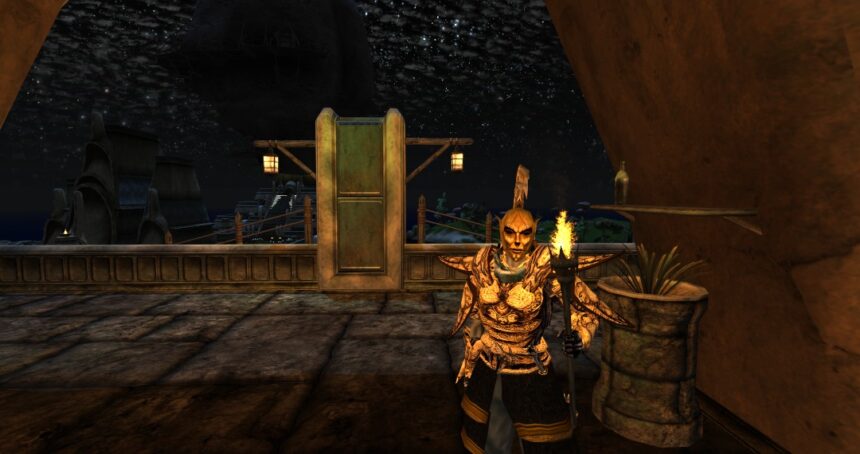Having begun work on it sometime after the domestication of rice, the heroic mad lads over at OpenMW—the open-source engine reimplementation for The Elder Scrolls 3: Morrowind that lets you play it with a minimum of fuss on pretty much any modern OS—have finally released its much-anticipated 0.49 update. Okay, work actually began on it almost three years ago, but do you remember what you were doing three years ago? Me neither. Pretty much the Bronze Age.
This is a big one, folks, and I strongly recommend trawling through its giganto release post if only because capo, its author, is a genuinely entertaining writer. But to boil it down: Morrowind players have been lusting after a full release for 0.49 for some time, in no small part because of the way it buffs up OpenMW’s capacity to handle lua mods.
I can’t pretend to have the knowledge required to break down the programming nitty-gritty here, but you can hardly blame me: some parts of it are downright esoteric even to the OpenMW team: “We’ll start with melee combat,” say the devs. “Nobody knows how it works, and if you think you do, you don’t. Even if your name is Todd Howard.”
But let me try to break down the essence of the upgrade anyway. For a while now, there’s been a bit of a split whenever some newbie comes along asking the best way to play Morrowind for the first time. On the one hand, plenty of people recommended pre-0.49 versions of OpenMW—it’s easy to setup, stable, and you can pretty much just install it and play the game without much faff, enjoying modcons like 16:9 support and limited gamepad functionality.
On the other hand, plenty of people recommended sticking with vanilla Morrowind and its corpus of scripting and graphics extenders: plugins you can install to expand what mods can do, and that let you get buckwild with the game’s graphics, UI, and gameplay. It’s not that OpenMW was totally bare of that stuff—modding heroes have done things like turn OpenMW into an isometric game—but there were more mods, and more robust support for them, over on the vanilla Morrowind side. It had the advantage of existing for over two decades.
But now, says the OpenMW team, 0.49 is a “marked step forward for OpenMW-lua,” the open-source project’s own implementation of the lua black-magic toolkit. “Lua scripting can now interact with the game’s animations, audio, magic, quests, virtual filesystem, create and teleport game objects, load YAML data serialisation format files, load and save the game, and more. It is also much more stable!” Plenty of mods, and the very handy OpenMW mod auto-installer Modding-OpenMW, have required 0.49 release candidates for a while now already, such is its superiority.
That’s on top of 0.49’s fat tome of other tweaks, updates, additions, and fixes. For instance, you can now set rain not to clip through outdoor coverings. We’re in a whole new world, people.
It’s excellent news, and at least for me might mark a final goodbye to Morrowind in its vanilla form. At the very least, my next Morrowind playthrough is almost certainly going to be OpenMW-based if only so I can check out all the new bells and whistles.
Oh, and one last surprise: you can play Skyrim in it now. Kind of. “We’ve begun prototyping support for Oblivion (2006), Skyrim, Fallout 3, Fallout: New Vegas and Fallout 4, games based on later revisions of Bethesda’s open-world game engine,” writes the OpenMW team. “As we’re picking the low-hanging fruits, early support includes very basic ‘walking simulator’ functionality.” Attached screenshots show a few recognisable spaces—the Imperial City, Whiterun, your bathroom in Fallout 4—devoid of NPCs. Still, it’s very impressive and entirely unexpected, at least for me.
“Morrowind compatibility is likely to forever remain the primary and sacred focus,” assures the team. “That being said, and OpenMW being technically a very strange implementation of the Creation Engine, adapting it to other games will actually allow us to improve Morrowind-compatible tooling and file formats and have Bethesda’s own ideas and improvements on their open world game formula guide us.” Sure, why not? It’s time for OpenEverything.
Read the full article here










